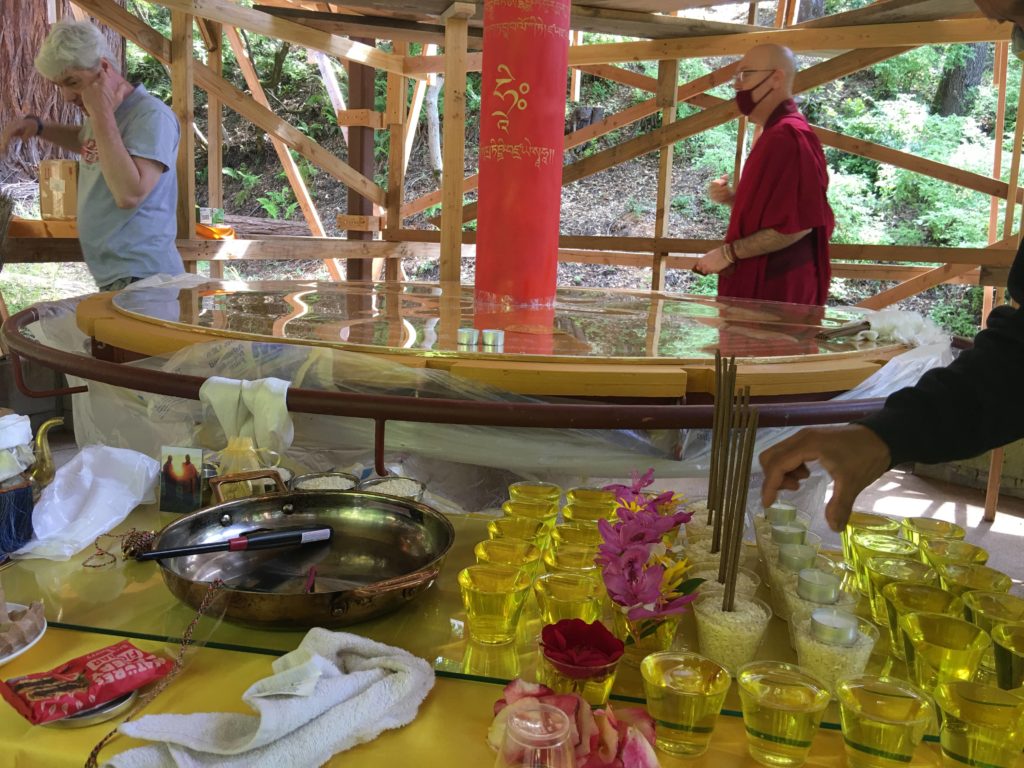05 Jun Planting the Seeds of Enlightenment
Just over a year ago, when Gendun Drubpa Buddhist Center in Canada requested me to continue as resident teacher as my initial three-year commitment was finishing, Lama Zopa Rinpoche decided that, instead of that option or any of the others available to me at the time, moving to Vajrapani Institute as resident teacher was the most beneficial. At the time, I was a little surprised, as there are so many teachers in the Bay Area and I was used to being placed in FPMT centers in remote areas with no other access to Dharma teachings. But as I discussed the vision of my tenure at Vajrapani Institute with Fabienne, Rinpoche’s decision began to make sense.
This is my third time at Vajrapani Institute. I first came to the land in April of 1992 in the capacity of co-director, and again in 2009 as resident teacher before transitioning to touring teacher for the FPMT for a number of years. This time, not only is my vision quite different than it has been, but I feel the vision of Vajrapani has also transformed, and it feels like a great match.
When I first started teaching, it was just after emerging from many years of long retreat. At that point, I was excited to present the very traditional Buddhist teachings – “Enlightenment or bust!” In the intervening years, as I gain more experience as a teacher, I realized that anything I can possibly teach someone that will help them to suffer less is “Good enough, dear,” as Lama Yeshe would say.
Most students these days don’t come to our centers to learn the path to enlightenment. Most come because they are in emotional pain and turmoil, or can’t seem to find happiness wherever they look, or just feel a deep sense of meaninglessness about their lives that nothing seems to assuage. In presenting beginners’ programs, such as introductory meditation courses, and secular programs, like the Cultivating Emotional Balance program, I’ve seen people’s minds (and faces!) transform as they learn tools for helping them deal with their out-of-control emotions, start to investigate strategies for making their lives more meaningful, and develop their compassion and loving-kindness. And even, sometimes, awaken a glimmering of an interest in the higher goals of Buddhism, such as liberation and enlightenment!
I see the courses that Vajrapani Institute is beginning to develop and offer on a regular basis, such as the Compassionate Conversations interfaith retreat, Cultivating Emotional Balance, Mindfulness-Based Stress Reduction, and Compassion Cultivation Training, as being an important bridge, enabling students to engage with ideas drawn from Buddhism in a way that is practical and gives them the much-needed tools for dealing with the struggles they are experiencing. And these programs are bridging in the sense that they also can, and often do, lead to an interest in more profound spiritual goals. I’ve seen many new students attend one of these programs and then, because of the interest that has been awakened and due to their familiarity with Vajrapani Institute, continue their studies with the more traditional Buddhist offerings such as the annual lamrim retreats, the shiné retreats, and even tantric teachings.
Because of this, Lama Zopa’s advice now makes perfect sense. I feel honored and excited to be part of the manifestation of this vision to serve beings in all these diverse ways – isn’t this what the Buddha was talking about when he emphasized “skillful means”?




